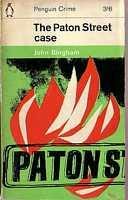
The Thorn Birds by Colleen McCullough
Review by Mirah Welday (mwelday)
Earlier this year, the world said its final good-bye to acclaimed Australian author Colleen McCullough. McCullough’s The Thorn Birds is one of my favorite novels and I’ve read it several times over the past 20 years. The first time I read The Thorn Birds was in 1994 for a high school book report. Yes, I said high school book report. I saw the mini series when it was released on VHS (some of you may remember those) and I fell in love with Drogheda (the sheep station), the Cleary family, and Australia; I had to read the book. I aced that book report. I recently read the multi-generational saga once again, in honor of Colleen McCullough’s life and extraordinary writing career. Words like ‘magnificent’, ‘sweeping’, and ‘epic’ are thrown about for books quite often but those words truly fit The Thorn Birds.
Each time I read the novel I become absorbed in the characters and their tangled lives. The Cleary family’s secrets, turmoils and triumphs hold me in their grasp from page one. McCullough masterfully blended together the lives of characters who think they are unlike anyone else; in reality, they are continuing a cycle of miscommunication, self-sacrifice, and indifference. For example, Meggie thinks she has nothing in common with her mother Fee but they make similar choices throughout their lives and experience similar consequences. Family secrets are at the heart of all of the pain and heartbreak throughout the novel; this is seen most vividly through Frank, Meggie’s oldest brother.
When I first read The Thorn Birds I was determined that one day I would visit Australia. McCullough brings Australia and the Outback to life, portraying it as a complex character that is at times generous and at other times condemning. The complexities of the land shape the personalities of the people living on it and their positions within the family. Living off the land for some characters seems to almost be a beloved struggle; the characters get their sense of self-worth by being a part of Drogheda.
The Thorn Birds is a complex, beautiful novel that delivers a different reading experience each time I dive into its pages. It is a timeless classic full of passion and strength. I still haven’t gotten a chance to visit Australia but when I do get there I will look on it fondly as a friend I’ve known for years. Thank you, Colleen McCullough, for your wonderful masterpiece and for giving me a chance to experience Australia through your words.







